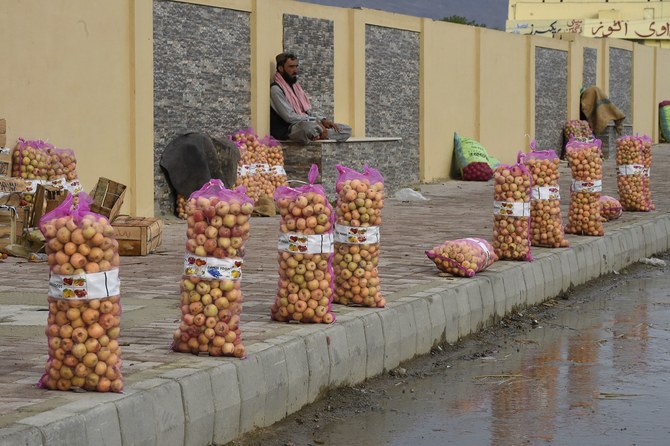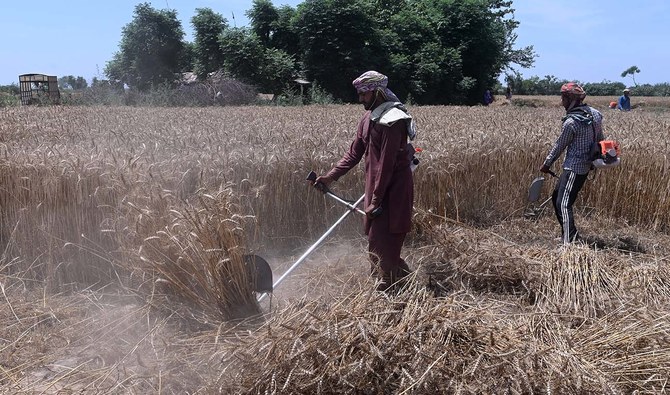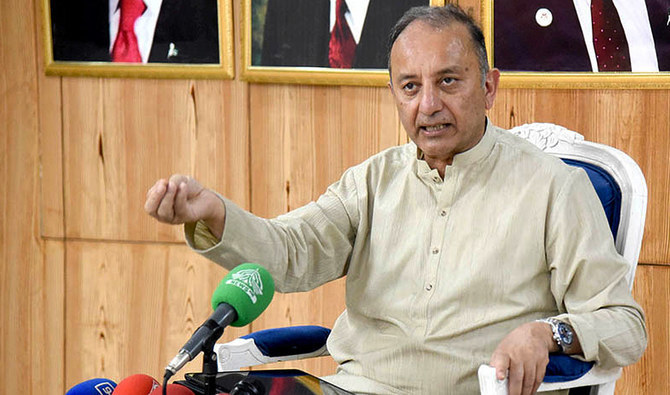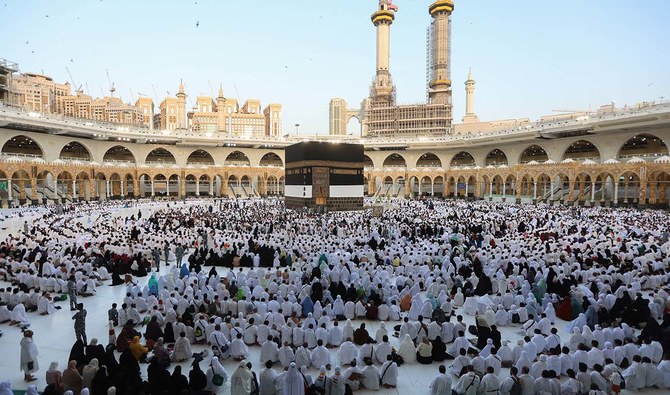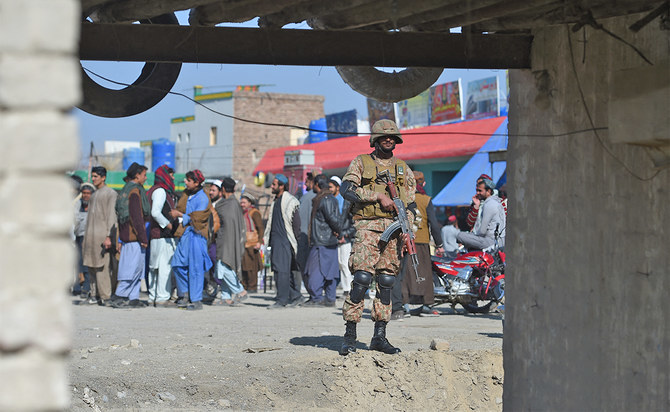KARACHI: Growers in the southwestern Balochistan province, where over 85 percent of Pakistan’s apples are produced, say the smuggling of Iranian apples into the country through the Afghanistan border has devalued their produce, making it hard for them even to cover costs.
Smuggling has long been a part of the illicit trade in Balochistan, where a thriving commerce in goods from guns and narcotics to duty free cigarettes and second-hand Toyotas constitutes one the arteries of the globalized criminal economy.
But now growers and officials in Balochistan, which borders Iran, say Iranian origin apples, produced and sold at a lower price than the Pakistani variety, are being brought in as Afghan imports, harming local business. By law, trade in Iranian goods must be conducted through the Taftan border crossing or other entry points on Pakistan’s border with Iran.
The reason traders are opting to bring the apples in via Afghanistan rather than Iran, officials explained, was that according to the Sales Tax Act 1990, edible goods’ imports from Afghanistan are exempt from tax collection, whereas other countries have to pay 17 percent per kilogramme (kg) as duty on exports to Pakistan, including of apples imported from Iran.
An importer has to pay Rs56 on the import of a kilogram of apples through Pakistan’s border with Iran, and only Rs8 through the Torkham border with Afghanistan, a customs official said.
Thus, said Akhtar Kakar, vice president of the Balochistan Chamber of Commerce, traders were evading paying higher taxes by documenting Iranian apples as imports from Afghanistan. Apples were being sent from Iran to Afghanistan and then exported by Afghan traders to Pakistan, he said.
Abdul Rauf, a senior official at the Agriculture Research Department Balochistan, said the country had produced 564693 tons of apples during 2017-18, of which 480,169 tons (85 percent) were produced in Balochistan.
Customs officials said 55362.403 metric tons of apples worth Rs6,195.13 million were imported through the Torkham border in 2019-20.
None of the officials or growers interviewed could specify the exact quantities of Iranian apples being smuggled into Pakistan via Afghanistan.
“Growers, who are already depressed by the severe climate change, are faced with huge financial losses due to the import of the Iranian apples,” Samiullah Kakar, a grower in Kan Mehtarzai, a town in Balochistan, said.
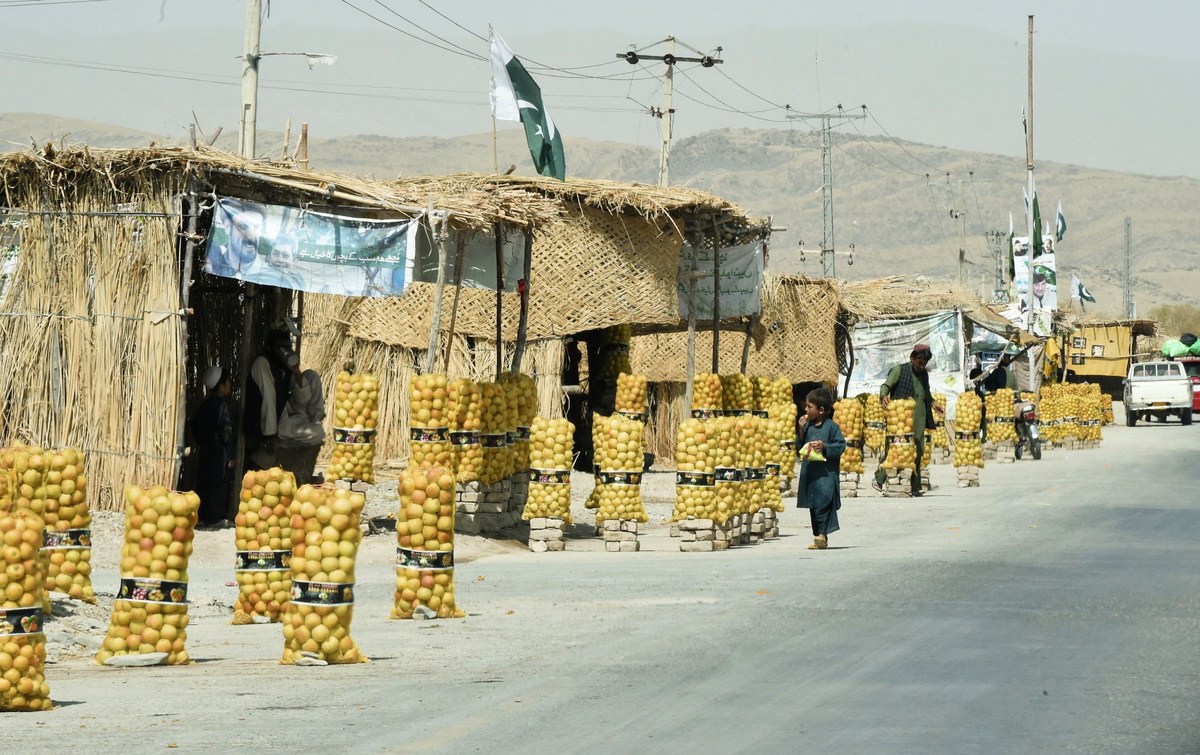
Pakistani vendors sell apples on a roadside stall in Killa Abdullah, a district in the north west of Balochistan province on August 29, 2017. (AFP / File photo)
Muhammad Salim, a collector of customs appraisement in Peshawar, admitted that it could not be “ruled out” that Iranian apples were being smuggled into Pakistan but said growers might be exaggerating the extent of the problem.
“The illegal flow of Iranian apples through unfrequented routes may not be ruled out due to significant exemption of duty/taxes available to Afghan origin apples,” Salim said, adding that the origin of agricultural produce, including apples, could not be ascertained on visual or physical examination or even through a lab test.
Salim said high duty on apples brought in from the Iran border compared to from Afghanistan “provides attraction to unscrupulous elements to push the illegal flow of Iranian apples into Pakistan using different modes and ways.”
He urged the commerce ministry to formulate ‘rules of origin’ and prescribe a credible certification mechanism to help customs implement stricter rules.
“The duty and other import levies structure on apples may be reviewed in consultation with all stakeholders,” Salim said, “so that huge difference of incidence of duty and taxes on Afghan origin apples may be curtailed and balanced to avoid smuggling of illegal flow of Iranian Apples in Pakistan.”
Kakar at the Balochistan Chamber of Commerce demanded that the government “immediately” stop Iranian produce from being imported via the Torkham border.
“We demand that this must be stopped immediately, as the country’s own produce is also available,” he said.
Kakar said it cost a grower Rs800 to produce a crate of apples in Pakistan, which would sell for Rs1600.
“But when apples arrive from Iran,” he said, “where it costs far less to farm, the prices drop to Rs1000 for mountainous apples and as low as Rs400 for apples being grown in plain areas.”



